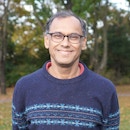Our bodies aren’t getting any younger, yet the process of aging remains largely a mystery — particularly when it comes to our brains. Scientists are hard at work examining what exactly happens in our brains as we get along in years and whether it’s possible to slow or even reverse those changes.
Alyssa Picchini Schaffer heads research collaborations at the Simons Foundation that aim to discover mechanisms of resilience and maintenance in the aging brain to identify ways to minimize cognitive decline and extend healthy lifespan.
But as research opens new windows into the brain’s inner workings, how do we traverse the emotional terrain and challenges accompanying such revelations?
In physician Sandeep Jauhar’s recent memoir, “My Father’s Brain: Life in the Shadow of Alzheimer’s,” he navigates the intimate intersection of science and personal experience by prompting us to consider what it means to truly and closely understand a neurological disorder like dementia that affects a person’s core identity.
Join them as they sit down with Ivan Oransky, editor-in-chief of Spectrum, to discuss the complexities of the aging brain and how we balance our advancing understanding with the emotional aspects of our lives.

Jauhar is a practicing cardiologist and has written three books, all published by Farrar, Straus, and Giroux. His first book, “Intern: A Doctor’s Initiation,” was a national bestseller. His forthcoming book, “My Father’s Brain,” is a memoir of his relationship with his father, especially during the last stage of his father’s life as he succumbed to dementia. The book is also about the brain and memory and the history and science of brain degeneration. In the book, Jauhar sets his father’s descent into Alzheimer’s alongside his journey toward understanding his father’s disease. He is currently a contributing opinion writer for The New York Times. He has appeared frequently on National Public Radio, CNN and MSNBC to discuss issues related to medicine, and his essays have also been published in The Wall Street Journal, Time, and Slate. Jauhar earned a Ph.D. in experimental physics at the University of California, Berkeley, before studying medicine at Washington University in St. Louis.
Picchini Schaffer is a vice president and senior scientist at the Simons Foundation, where she manages the foundation’s neuroscience collaborations (the Simons Collaboration on the Global Brain and the Simons Collaboration on Plasticity and the Aging Brain) and the Pivot Fellowship. Picchini Schaffer has a diverse background and expertise in neural stem cell biology, pharmacology, policy and media across business, government and academic sectors. Before joining the foundation, Picchini Schaffer was scientific director of TEDMED, a division of TED focused on science, health and medicine. She earned her Ph.D. from Columbia University and is an alumna of the AAAS Science and Technology Policy Fellowship and Lafayette College. Outside of her work in science, Picchini Schaffer is a board member for Partners in Promise, an organization that advocates for the educational rights of military children with special needs, and board treasurer for the Heartbeat Music Project, an organization that offers music education for Navajo (Diné) K-12 students living on the Navajo Reservation in New Mexico.
 Sandeep Jauhar, M.D., Ph.D.Author
Sandeep Jauhar, M.D., Ph.D.Author Alyssa Picchini Schaffer, Ph.D.Vice President and Senior Scientist, Neuroscience Collaborations
Alyssa Picchini Schaffer, Ph.D.Vice President and Senior Scientist, Neuroscience Collaborations 